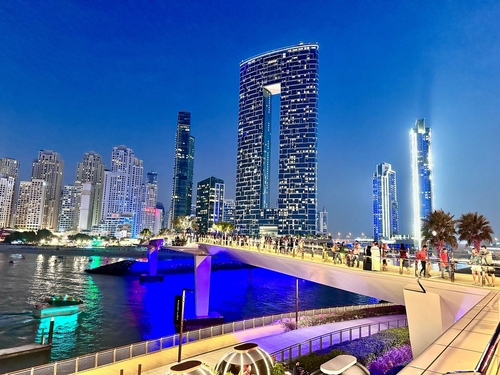Online Speech Is Now An Existential Question For Tech
Content moderation rules used to be a question of taste. Now, they can determine a service’s prospects for survival.
Every public communication platform you can name—from Facebook, Twitter and YouTube to Parler, Pinterest and Discord—is wrestling with the same two questions:
How do we make sure we’re not facilitating misinformation, violence, fraud or hate speech?
At the same time, how do we ensure we’re not censoring users?
The more they moderate content, the more criticism they experience from those who think they’re over-moderating. At the same time, any statement on a fresh round of moderation provokes some to point out objectionable content that remains. Like any question of editorial or legal judgment, the results are guaranteed to displease someone, somewhere—including Congress, which this week called the chief executives of Facebook, Google and Twitter to a hearing on March 25 to discuss misinformation on their platforms.
For many services, this has gone beyond a matter of user experience, or growth rates, or even ad revenue. It’s become an existential crisis. While dialling up moderation won’t solve all of a platform’s problems, a look at the current winners and losers suggests that not moderating enough is a recipe for extinction.
Facebook is currently wrestling with whether it will continue its ban of former president Donald Trump. Pew Research says 78% of Republicans opposed the ban, which has contributed to the view of many in Congress that Facebook’s censorship of conservative speech justifies breaking up the company—something a decade of privacy scandals couldn’t do.
Parler, a haven for right-wing users who feel alienated by mainstream social media, was taken down by its cloud service provider, Amazon Web Services, after some of its users live-streamed the riot at the U.S. Capitol on Jan. 6. Amazon cited Parler’s apparent inability to police content that incites violence. While Parler is back online with a new service provider, it’s unclear if it has the infrastructure to serve a large audience.
During the weeks Parler was offline, the company implemented algorithmic filtering for a few content types, including threats and incitement, says a company spokesman. The company also has an automatic filter for “trolling” that detects such content, but it’s up to users whether to turn it on or not. In addition, those who choose to troll on Parler are not penalized in Parler’s algorithms for doing so, “in the spirit of First Amendment,” says the company’s guidelines for enforcement of its content moderation policies. Parler recently fired its CEO, who said he experienced resistance to his vision for the service, including how it should be moderated.
Now, just about every site that hosts user-generated content is carefully weighing the costs and benefits of updating their content moderation systems, using a mix of human professionals, algorithms and users. Some are even building rules into their services to pre-empt the need for increasingly costly moderation.
The saga of gaming-focused messaging app Discord is instructive: In 2018, the service, which is aimed at children and young adults, was one of those used to plan the Charlottesville riots. A year later, the site was still taking what appeared to be a deliberately laissez-faire approach to content moderation.
By this January, however, spurred by reports of hate speech and lurking child predators, Discord had done a complete 180. It now has a team of machine-learning engineers building systems to scan the service for unacceptable uses, and has assigned 15% of its overall staff to trust and safety issues.
This newfound attention to content moderation helped keep Discord away from the controversy surrounding the Capitol riot, and caused it to briefly ban a chat group associated with WallStreetBets during the GameStop stock runup. Discord’s valuation doubled to $7 billion over roughly the same period, a validation that investors have confidence in its moderation strategy.
The prevalence problem
The challenge successful platforms face is moderating content “at scale,” across millions or billions of pieces of shared content.
Before any action can be taken, services must decide what should be taken down, an often slow and deliberative process.
Imagine, for example, that a grass-roots movement gains momentum in a country, and begins espousing extreme and potentially dangerous ideas on social media. While some language might be caught by algorithms immediately, a decision about whether discussion of a particular movement, like QAnon, should be banned completely, could take months on a service such as YouTube, says a Google spokesman.
One reason it can take so long is the global nature of these platforms. Google’s policy team might consult with experts in order to consider regional sensitivities before making a decision. After a policy decision is made, the platform has to train AI and write rules for human moderators to enforce it—then make sure both are carrying out the policies as intended, he adds.
While AI systems can be trained to catch individual pieces of problematic content, they’re often blind to the broader meaning of a body of posts, says Tracy Chou, founder of content-moderation startup Block Party and former tech lead at Pinterest.
Take the case of the “Stop the Steal” protest, which led to the deadly attack on the U.S. Capitol. Individual messages used to plan the attack, like “Let’s meet at location X,” would probably look innocent to a machine-learning system, says Ms Chou, but “the context is what’s key.” Facebook banned all content mentioning “Stop the Steal” after the riot.
Even after Facebook has identified a particular type of content as harmful, why does it seem constitutionally unable to keep it off its platform?
It’s the “prevalence problem.” On a truly gigantic service, even if only a tiny fraction of content is problematic, it can still reach millions of people. Facebook has started publishing a quarterly report on its community standards enforcement. During the last quarter of 2020, Facebook says users saw seven or eight pieces of hate speech out of every 10,000 views of content. That’s down from 10 or 11 pieces the previous quarter. The company said it will begin allowing third-party audits of these claims this year.
While Facebook has been leaning heavily on AI to moderate content, especially during the pandemic, it currently has about 15,000 human moderators. And since every new moderator comes with a fixed additional cost, the company has been seeking more efficient ways for its AI and existing humans to work together.
In the past, human moderators reviewed content flagged by machine learning algorithms in more or less chronological order. Content is now sorted by a number of factors, including how quickly it’s spreading on the site, says a Facebook spokesman. If the goal is to reduce the number of times people see harmful content, the most viral stuff should be top priority.
A content moderator in every pot
Companies that aren’t Facebook or Google often lack the resources to field their own teams of moderators and machine-learning engineers. They have to consider what’s within their budget, which includes outsourcing the technical parts of content moderation to companies such as San Francisco-based startup Spectrum Labs.
Through its cloud-based service, Spectrum Labs shares insights it gathers from any one of its clients with all of them—which include Pinterest and Riot Games, maker of League of Legends—in order to filter everything from bad words and human trafficking to hate speech and harassment, says CEO Justin Davis.
Mr Davis says Spectrum Labs doesn’t say what clients should and shouldn’t ban. Beyond illegal content, every company decides for itself what it deems acceptable, he adds.
Pinterest, for example, has a mission rooted in “inspiration,” and this helps it take a clear stance in prohibiting harmful or objectionable content that violates its policies and doesn’t fit its mission, says a company spokeswoman.
Services are also attempting to reduce the content-moderation load by reducing the incentives or opportunity for bad behaviour. Pinterest, for example, has from its earliest days minimized the size and significance of comments, says Ms Chou, the former Pinterest engineer, in part by putting them in a smaller typeface and making them harder to find. This made comments less appealing to trolls and spammers, she adds.
The dating app Bumble only allows women to reach out to men. Flipping the script of a typical dating app has arguably made Bumble more welcoming for women, says Mr Davis, of Spectrum Labs. Bumble has other features designed to pre-emptively reduce or eliminate harassment, says Chief Product Officer Miles Norris, including a “super block” feature that builds a comprehensive digital dossier on banned users. This means that if, for example, banned users attempt to create a new account with a fresh email address, they can be detected and blocked based on other identifying features.
The ‘supreme court of content’
Facebook CEO Mark Zuckerberg recently described Facebook as something between a newspaper and a telecommunications company. For it to continue being a global town square, it doesn’t have the luxury of narrowly defining the kinds of content and interactions it will allow. For its toughest content moderation decisions, it has created a higher power—a financially independent “oversight board” that includes a retired U.S. federal judge, a former prime minister of Denmark and a Nobel Peace Prize laureate.
In its first decision, the board overturned four of the five bans Facebook brought before it.
Facebook has said that it intends the decisions made by its “supreme court of content” to become part of how it makes everyday decisions about what to allow on the site. That is, even though the board will make only a handful of decisions a year, these rulings will also apply when the same content is shared in a similar way. Even with that mechanism in place, it’s hard to imagine the board can get to more than a tiny fraction of the types of situations content moderators and their AI assistants must decide every day.
But the oversight board might accomplish the goal of shifting the blame for Facebook’s most momentous moderation decisions. For example, if the board rules to reinstate the account of former President Trump, Facebook could deflect criticism of the decision by noting it was made independent of its own company politics.
Meanwhile, Parler is back up, but it’s still banned from the Apple and Google app stores. Without those essential routes to users—and without web services as reliable as its former provider, Amazon—it seems unlikely that Parler can grow anywhere close to the rate it otherwise might have. It’s not clear yet whether Parler’s new content filtering algorithms will satisfy Google and Apple. How the company balances its enhanced moderation with its stated mission of being a “viewpoint neutral” service will determine whether it grows to be a viable alternative to Twitter and Facebook or remains a shadow of what it could be with such moderation.
 Copyright 2020, Dow Jones & Company, Inc. All Rights Reserved Worldwide. LEARN MORE
Copyright 2020, Dow Jones & Company, Inc. All Rights Reserved Worldwide. LEARN MORE
This stylish family home combines a classic palette and finishes with a flexible floorplan
Just 55 minutes from Sydney, make this your creative getaway located in the majestic Hawkesbury region.
As Paris makes its final preparations for the Olympic games, its residents are busy with their own—packing their suitcases, confirming their reservations, and getting out of town.
Worried about the hordes of crowds and overall chaos the Olympics could bring, Parisians are fleeing the city in droves and inundating resort cities around the country. Hotels and holiday rentals in some of France’s most popular vacation destinations—from the French Riviera in the south to the beaches of Normandy in the north—say they are expecting massive crowds this year in advance of the Olympics. The games will run from July 26-Aug. 1.
“It’s already a major holiday season for us, and beyond that, we have the Olympics,” says Stéphane Personeni, general manager of the Lily of the Valley hotel in Saint Tropez. “People began booking early this year.”
Personeni’s hotel typically has no issues filling its rooms each summer—by May of each year, the luxury hotel typically finds itself completely booked out for the months of July and August. But this year, the 53-room hotel began filling up for summer reservations in February.
“We told our regular guests that everything—hotels, apartments, villas—are going to be hard to find this summer,” Personeni says. His neighbours around Saint Tropez say they’re similarly booked up.
As of March, the online marketplace Gens de Confiance (“Trusted People”), saw a 50% increase in reservations from Parisians seeking vacation rentals outside the capital during the Olympics.
Already, August is a popular vacation time for the French. With a minimum of five weeks of vacation mandated by law, many decide to take the entire month off, renting out villas in beachside destinations for longer periods.
But beyond the typical August travel, the Olympics are having a real impact, says Bertille Marchal, a spokesperson for Gens de Confiance.
“We’ve seen nearly three times more reservations for the dates of the Olympics than the following two weeks,” Marchal says. “The increase is definitely linked to the Olympic Games.”

Getty Images
According to the site, the most sought-out vacation destinations are Morbihan and Loire-Atlantique, a seaside region in the northwest; le Var, a coastal area within the southeast of France along the Côte d’Azur; and the island of Corsica in the Mediterranean.
Meanwhile, the Olympics haven’t necessarily been a boon to foreign tourism in the country. Many tourists who might have otherwise come to France are avoiding it this year in favour of other European capitals. In Paris, demand for stays at high-end hotels has collapsed, with bookings down 50% in July compared to last year, according to UMIH Prestige, which represents hotels charging at least €800 ($865) a night for rooms.
Earlier this year, high-end restaurants and concierges said the Olympics might even be an opportunity to score a hard-get-seat at the city’s fine dining.
In the Occitanie region in southwest France, the overall number of reservations this summer hasn’t changed much from last year, says Vincent Gare, president of the regional tourism committee there.
“But looking further at the numbers, we do see an increase in the clientele coming from the Paris region,” Gare told Le Figaro, noting that the increase in reservations has fallen directly on the dates of the Olympic games.
Michel Barré, a retiree living in Paris’s Le Marais neighbourhood, is one of those opting for the beach rather than the opening ceremony. In January, he booked a stay in Normandy for two weeks.
“Even though it’s a major European capital, Paris is still a small city—it’s a massive effort to host all of these events,” Barré says. “The Olympics are going to be a mess.”
More than anything, he just wants some calm after an event-filled summer in Paris, which just before the Olympics experienced the drama of a snap election called by Macron.
“It’s been a hectic summer here,” he says.

AFP via Getty Images
Parisians—Barré included—feel that the city, by over-catering to its tourists, is driving out many residents.
Parts of the Seine—usually one of the most popular summertime hangout spots —have been closed off for weeks as the city installs bleachers and Olympics signage. In certain neighbourhoods, residents will need to scan a QR code with police to access their own apartments. And from the Olympics to Sept. 8, Paris is nearly doubling the price of transit tickets from €2.15 to €4 per ride.
The city’s clear willingness to capitalise on its tourists has motivated some residents to do the same. In March, the number of active Airbnb listings in Paris reached an all-time high as hosts rushed to list their apartments. Listings grew 40% from the same time last year, according to the company.
With their regular clients taking off, Parisian restaurants and merchants are complaining that business is down.
“Are there any Parisians left in Paris?” Alaine Fontaine, president of the restaurant industry association, told the radio station Franceinfo on Sunday. “For the last three weeks, there haven’t been any here.”
Still, for all the talk of those leaving, there are plenty who have decided to stick around.
Jay Swanson, an American expat and YouTuber, can’t imagine leaving during the Olympics—he secured his tickets to see ping pong and volleyball last year. He’s also less concerned about the crowds and road closures than others, having just put together a series of videos explaining how to navigate Paris during the games.
“It’s been 100 years since the Games came to Paris; when else will we get a chance to host the world like this?” Swanson says. “So many Parisians are leaving and tourism is down, so not only will it be quiet but the only people left will be here for a party.”
This stylish family home combines a classic palette and finishes with a flexible floorplan
Just 55 minutes from Sydney, make this your creative getaway located in the majestic Hawkesbury region.






















